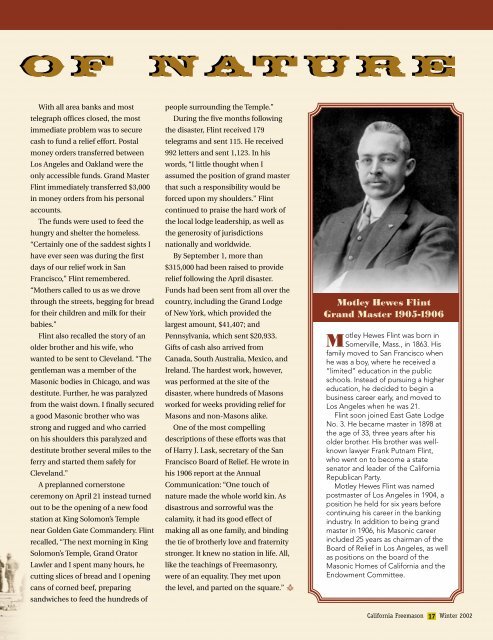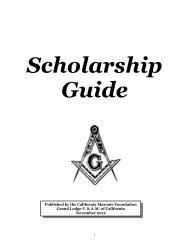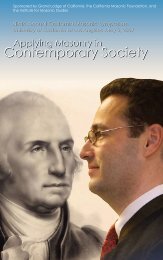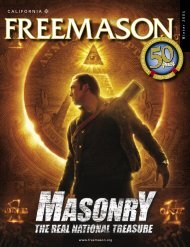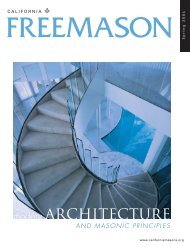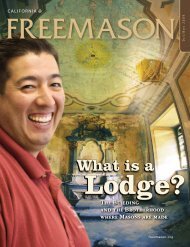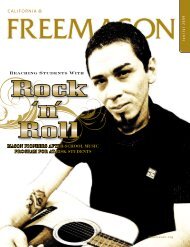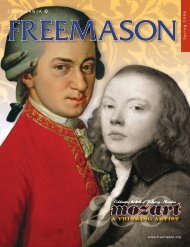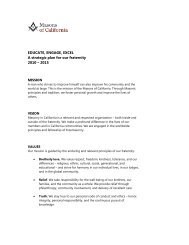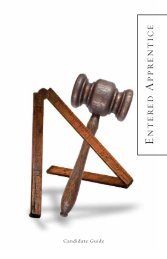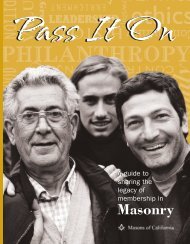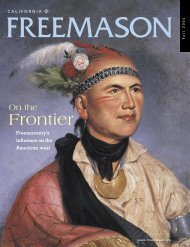Winter 2002 (4.6MB) - Grand Masonic Lodge of California
Winter 2002 (4.6MB) - Grand Masonic Lodge of California
Winter 2002 (4.6MB) - Grand Masonic Lodge of California
Create successful ePaper yourself
Turn your PDF publications into a flip-book with our unique Google optimized e-Paper software.
<strong>of</strong> Nature<br />
<strong>of</strong> Nature<br />
With all area banks and most<br />
telegraph <strong>of</strong>fices closed, the most<br />
immediate problem was to secure<br />
cash to fund a relief effort. Postal<br />
money orders transferred between<br />
Los Angeles and Oakland were the<br />
only accessible funds. <strong>Grand</strong> Master<br />
Flint immediately transferred $3,000<br />
in money orders from his personal<br />
accounts.<br />
The funds were used to feed the<br />
hungry and shelter the homeless.<br />
“Certainly one <strong>of</strong> the saddest sights I<br />
have ever seen was during the first<br />
days <strong>of</strong> our relief work in San<br />
Francisco,” Flint remembered.<br />
“Mothers called to us as we drove<br />
through the streets, begging for bread<br />
for their children and milk for their<br />
babies.”<br />
Flint also recalled the story <strong>of</strong> an<br />
older brother and his wife, who<br />
wanted to be sent to Cleveland. “The<br />
gentleman was a member <strong>of</strong> the<br />
<strong>Masonic</strong> bodies in Chicago, and was<br />
destitute. Further, he was paralyzed<br />
from the waist down. I finally secured<br />
a good <strong>Masonic</strong> brother who was<br />
strong and rugged and who carried<br />
on his shoulders this paralyzed and<br />
destitute brother several miles to the<br />
ferry and started them safely for<br />
Cleveland.”<br />
A preplanned cornerstone<br />
ceremony on April 21 instead turned<br />
out to be the opening <strong>of</strong> a new food<br />
station at King Solomon’s Temple<br />
near Golden Gate Commandery. Flint<br />
recalled, “The next morning in King<br />
Solomon’s Temple, <strong>Grand</strong> Orator<br />
Lawler and I spent many hours, he<br />
cutting slices <strong>of</strong> bread and I opening<br />
cans <strong>of</strong> corned beef, preparing<br />
sandwiches to feed the hundreds <strong>of</strong><br />
people surrounding the Temple.”<br />
During the five months following<br />
the disaster, Flint received 179<br />
telegrams and sent 115. He received<br />
992 letters and sent 1,123. In his<br />
words, “I little thought when I<br />
assumed the position <strong>of</strong> grand master<br />
that such a responsibility would be<br />
forced upon my shoulders.” Flint<br />
continued to praise the hard work <strong>of</strong><br />
the local lodge leadership, as well as<br />
the generosity <strong>of</strong> jurisdictions<br />
nationally and worldwide.<br />
By September 1, more than<br />
$315,000 had been raised to provide<br />
relief following the April disaster.<br />
Funds had been sent from all over the<br />
country, including the <strong>Grand</strong> <strong>Lodge</strong><br />
<strong>of</strong> New York, which provided the<br />
largest amount, $41,407; and<br />
Pennsylvania, which sent $20,933.<br />
Gifts <strong>of</strong> cash also arrived from<br />
Canada, South Australia, Mexico, and<br />
Ireland. The hardest work, however,<br />
was performed at the site <strong>of</strong> the<br />
disaster, where hundreds <strong>of</strong> Masons<br />
worked for weeks providing relief for<br />
Masons and non-Masons alike.<br />
One <strong>of</strong> the most compelling<br />
descriptions <strong>of</strong> these efforts was that<br />
<strong>of</strong> Harry J. Lask, secretary <strong>of</strong> the San<br />
Francisco Board <strong>of</strong> Relief. He wrote in<br />
his 1906 report at the Annual<br />
Communication: “One touch <strong>of</strong><br />
nature made the whole world kin. As<br />
disastrous and sorrowful was the<br />
calamity, it had its good effect <strong>of</strong><br />
making all as one family, and binding<br />
the tie <strong>of</strong> brotherly love and fraternity<br />
stronger. It knew no station in life. All,<br />
like the teachings <strong>of</strong> Freemasonry,<br />
were <strong>of</strong> an equality. They met upon<br />
the level, and parted on the square.”<br />
Motley Hewes Flint<br />
<strong>Grand</strong> Master 1905-1906<br />
Motley Hewes Flint was born in<br />
Somerville, Mass., in 1863. His<br />
family moved to San Francisco when<br />
he was a boy, where he received a<br />
“limited” education in the public<br />
schools. Instead <strong>of</strong> pursuing a higher<br />
education, he decided to begin a<br />
business career early, and moved to<br />
Los Angeles when he was 21.<br />
Flint soon joined East Gate <strong>Lodge</strong><br />
No. 3. He became master in 1898 at<br />
the age <strong>of</strong> 33, three years after his<br />
older brother. His brother was wellknown<br />
lawyer Frank Putnam Flint,<br />
who went on to become a state<br />
senator and leader <strong>of</strong> the <strong>California</strong><br />
Republican Party.<br />
Motley Hewes Flint was named<br />
postmaster <strong>of</strong> Los Angeles in 1904, a<br />
position he held for six years before<br />
continuing his career in the banking<br />
industry. In addition to being grand<br />
master in 1906, his <strong>Masonic</strong> career<br />
included 25 years as chairman <strong>of</strong> the<br />
Board <strong>of</strong> Relief in Los Angeles, as well<br />
as positions on the board <strong>of</strong> the<br />
<strong>Masonic</strong> Homes <strong>of</strong> <strong>California</strong> and the<br />
Endowment Committee.<br />
<strong>California</strong> Freemason 17 <strong>Winter</strong> <strong>2002</strong>


